IN THE BEGINNING, IT WAS EVEN GREASIER
Apparently Los Angeles is not the only city prone to over-praise its local theater. American Theater Company’s The Original Grease has been receiving consistently strong reviews and national attention for its return to the “gritty” musical that started at Chicago’s Kingston Mines Theatre Company in 1971. While a deeper sense of history now grounds the pop culture phenomenon, this unwieldy Grease may make you nostalgic for the relative coherence of the 1972 Broadway version or the 1978 film.
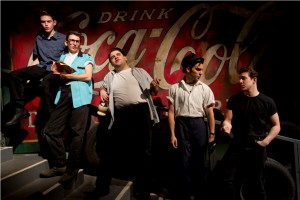 In a stunning and immersive design, Grease makes a welcome return to its working class roots on the Northwest Side of Chicago in 1959. Walt Spangler crafts a gritty realist set in ATC’s warehouse space with tires spanning the walls, a cool wraparound car, signs advertising local businesses, and even a graffiti-covered toilet in the middle of the audience. Melissa Torchia’s naturalistic costumes are likewise a pleasant change from the homogenized leather and Pink Lady jackets of the film. Perhaps most notable are the local references and vulgar language that punctuate Jim Jacobs and Warren Casey’s book; historical specificity is this production’s greatest strength.
In a stunning and immersive design, Grease makes a welcome return to its working class roots on the Northwest Side of Chicago in 1959. Walt Spangler crafts a gritty realist set in ATC’s warehouse space with tires spanning the walls, a cool wraparound car, signs advertising local businesses, and even a graffiti-covered toilet in the middle of the audience. Melissa Torchia’s naturalistic costumes are likewise a pleasant change from the homogenized leather and Pink Lady jackets of the film. Perhaps most notable are the local references and vulgar language that punctuate Jim Jacobs and Warren Casey’s book; historical specificity is this production’s greatest strength.
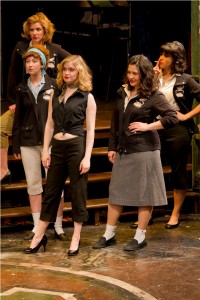 Yet the original script flounders when it comes to narrative. Grease has never been a well-integrated musical, but the book for this production – reconstructed by Jim Casey and director PJ Paparelli – feels inexcusably sloppy. Although bad boy Danny’s character is beefed up with a new song, “How Big I’m Gonna Be,” Sandy’s narrative arc from good girl to popular Pink Lady is particularly diffuse. While Rizzo is better developed than in the film, the resolution of her potential pregnancy is too quick and tidy. Then again, Grease has never been very interested in well-rounded female characters.
Yet the original script flounders when it comes to narrative. Grease has never been a well-integrated musical, but the book for this production – reconstructed by Jim Casey and director PJ Paparelli – feels inexcusably sloppy. Although bad boy Danny’s character is beefed up with a new song, “How Big I’m Gonna Be,” Sandy’s narrative arc from good girl to popular Pink Lady is particularly diffuse. While Rizzo is better developed than in the film, the resolution of her potential pregnancy is too quick and tidy. Then again, Grease has never been very interested in well-rounded female characters.
A commanding actor can sometimes round a character in performance; unfortunately, ATC’s youthful leads simply suffice in their roles. Some actors seem poorly cast, including several legit voices unsuited for a rock ’˜n’ roll score (Sandy and Kenickie) and other voices that veer flat (Teen Angel). The ensemble’s back-up vocals tend to dominate the sound balance, and voices can’t always be heard over the band. This is particularly frustrating in those “original” songs with which the audience is unfamiliar; it is nearly impossible to decipher Danny and Sandy’s lyrics in their first duet, “Foster Beach,” for instance.
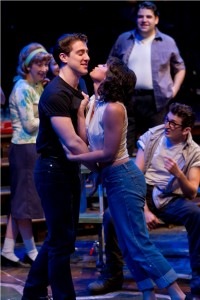 Most uncomfortably, The Original Grease seems to have one level: loud. The miked actors yell in scenes and scream in songs, and the heightened acting style works against the gritty realism of the concept. Sometimes, direction ignores the audience completely; much of Jim Corti’s choreography is crisp and playful (such as the raucous duet “Mooning”), but the hand jive is strangely performed with the cast’s backs to the audience. The ensemble may be facing Johnny Casino at the dance, but a little theatrical realism could invite the audience into this celebration.
Most uncomfortably, The Original Grease seems to have one level: loud. The miked actors yell in scenes and scream in songs, and the heightened acting style works against the gritty realism of the concept. Sometimes, direction ignores the audience completely; much of Jim Corti’s choreography is crisp and playful (such as the raucous duet “Mooning”), but the hand jive is strangely performed with the cast’s backs to the audience. The ensemble may be facing Johnny Casino at the dance, but a little theatrical realism could invite the audience into this celebration.
Then again, perhaps this denial of the audience’s familiar participatory pleasure is Corti’s intent. The Original Grease strives against the cleaned-up jukebox musical it has become, to varying degrees of success. In addition to a wonderfully naturalistic design, this production includes a few exciting moments in which Grease no longer feels like the shiny commercial hit audiences know so well. Songs such as “We Go Together” and “Tattoo Song” are performed a capella; these tunes arise naturally from narrative context as a bunch of bored high schoolers start harmonizing improvisationally. Suddenly, Grease becomes a play with music rather than a self-conscious musical. If only that naturalism could be sustained in all elements of the show, Grease could be quite a different theatrical experience.
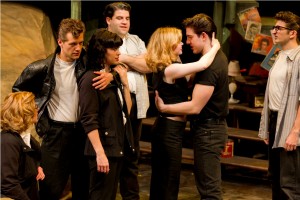 At the end of the day, though, The Original Grease is little more than an interesting historical experiment. For a musical theater scholar or avid Grease fan, it is exciting to see a full production of the “original” returned to its Chicago roots – but the audience will likely leave realizing the multitude of reasons why “Foster Beach” became the peppier “Summer Nights,” or why “Kiss It” was replaced by the sensational “You’re the One That I Want.” Although commercial imperatives may have minimized Grease’s local flavor, the transfer to Broadway and to film also made vital changes to streamline the narrative and improve the score. Is it really such a crime to want to sing along?
At the end of the day, though, The Original Grease is little more than an interesting historical experiment. For a musical theater scholar or avid Grease fan, it is exciting to see a full production of the “original” returned to its Chicago roots – but the audience will likely leave realizing the multitude of reasons why “Foster Beach” became the peppier “Summer Nights,” or why “Kiss It” was replaced by the sensational “You’re the One That I Want.” Although commercial imperatives may have minimized Grease’s local flavor, the transfer to Broadway and to film also made vital changes to streamline the narrative and improve the score. Is it really such a crime to want to sing along?
photos by Brett Beiner
The Original Grease
American Theater Company
ends on August 21, 2011
on March 4, 2018, American Theater Company ceased operations;
more on this story at Chicago Tribune
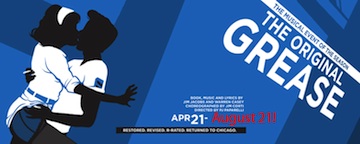

{ 4 comments… read them below or add one }
Hello,
We’re set to do Grease in September. We had hoped to do the original Chicago version but after reading your comments, maybe we should reconsider.
If you were to choose which Grease offers a better community theater experience, what would be your choice?
Frank Malle
Producer
Hi Frank,
A lot of critics raved about the original Chicago version at American Theater Company, but I think it was largely because of the local context; Chicago crowds got a kick out of hearing familiar places, slang, etc. in the script. Unless your theater is located in Chicago, I would not recommend the original Grease. The Broadway version strips away some of the Chicago specificity, but the structural and musical changes are for the better, in my opinion. And most audiences will be disappointed if they don’t get to hear “Summer Nights” or “You’re the One that I Want”!
Hope this is helpful!
Sarah
“You’re the One That I Want,” “Hopelessly Devoted to You,” “Sandy,” (all composed by by John Farrar) and “Grease” (by Barry Gibb) are not a part of the original 1972 Grease that is licensed by Samuel French, Inc. Those songs were written specifically for the movie. I’ve neither seen nor read the original script nor heard “Kiss It,” but that song is likely where “All Choked Up” is placed in the licensed 1972 version. The film songs can be used for stage productions, but royalties (per song/per performance) have to be paid to Warner Chappell Music.
I would kill to find the Grease theater program from 1971.